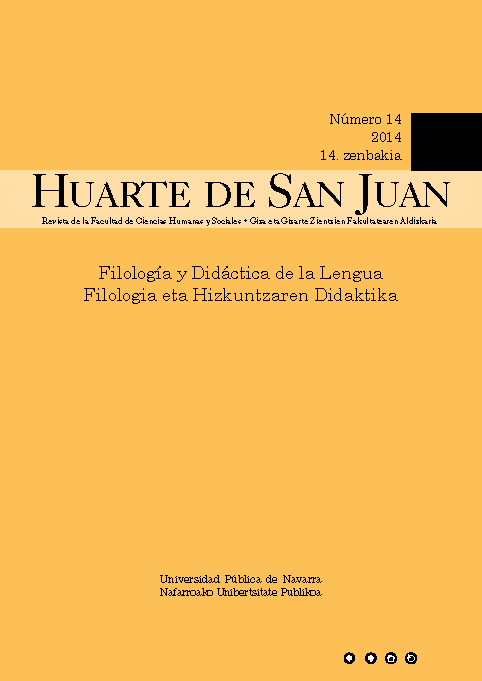Hábito lector y expresión oral formal en sujetos vascoparlantes que tienen el castellano como segunda lengua
Abstract
This article is a summary of a homonym study presented as master final project. The main aim of this research is to analyse the influence of the reading habit in the formal oral expression of second language learners. Our hypothesis believes that if learners are not exposed to contexts where the formal oral expression is worked, there will be no essential differences between both learners with or without the reading habit. For that purpose, a sample of 12 bilingual (Basque-Spanish) participants, aged 14, was taken among students of the third course at the high school level in the centre Andra Mari Ikastola from Etxarri-Aranatz. According to the tests conducted, the results show that, even though the learners with the reading habit obtained better marks in some linguistic aspects, it cannot be stated that the practice of reading itself has influenced the level of the oral expression. Other factors, such as the oral practice of the speakers, the knowledge of the language within the family or the individual effort of each student prove to be relevant in the explanation of the results.
Downloads
References
BALL, S. E. (2003): «The relation between reading and writing cevelopment in English and ESL student», EditorThesis (Ph.D.), Toronto, University of Toronto.
BALLESTEROS, C. y PALOU, J. (2005): «Las creencias del profesorado y la enseñanza de la lengua oral», en Vilá i Santasusana, M. (coord.), El discurso oral formal: contenidos de aprendizaje y secuencias didácticas, Barcelona, Grao, 101-116.
CAMPS, A. (1994): L’ensenyament de la composició escrita, Barcelona, Barcanova.
CAMPS, A. (2002): «Hablar en clase, aprender lengua», Aula de Innovación Educativa, mayo, XI (111), 6-10.
CONSEJERÍA DE EDUCACIÓN, Gobierno de Cantabria, «Plan lector». Disponible en [http://www.educantabria.es/docs/planes/plan_lector/plan_lector.pdfphpMyAdmin=DxoCAdBlc%2CANuNIkvc-WZcMiFvc], [consulta, 20 de mayo de 2014].
CROS, A. y VILÁ, M. (1997): «La llengua oral: propostes per a l’avaluació», en Ribas, T. (coord.), L’avaluació formativa en l’àrea de llengua, Barcelona, Graó.
DUPUY, B. y KRASHEN, S. (1993): «Incidental vocabulary adquisition in French as a foreign language», Applied Language Learning, nº 4 (1,2), 55-63.
KRASHEN, S. D. (2004): The power of reading: Insights from the Research, USA, Heinemann.
MACARTHUR, GRAHAM y FITZGERALD (2008): Handbook of writing research, Guildfor Press.
MILLER et al.: «Oral language and reading in bilingual children», Learning Disabilities Research & Practice, nº 21 (1): 30-43.
NAG, S. y SNOWLING, M. (2011): «Reading comprehension, decoding skills and oral language», EFL Journal, vol. 2, nº 2, 85-105 [http://linguaakshara.org/yahoo_site_admin/assets/docs/EFL_Journal_June_2011_Special_Issue.2953850.pdf], [consulta, 13 de mayo de 2014].
NAGY, W. E. (1988): «Teaching Vocabulary To Improve Reading Comprehension» ERIC Clearinghouse on Reading and Communication Skills, Urbana, Ill.; International Reading Association, Newark, Del.; Washington, DC.
SIM, Soh Hong. (2012): «Supporting children’s language and literacy skills: the effectiveness of shared book reading intervention sttrategies with parents» PhD Thesis, Queensland University of Technology, [http://eprints.qut.edu.au/60975/ [consulta, 25 de marzo de 2014].
VILÁ, M. (2009): «6 Criterios para enseñar lengua oral en la Educación Obligatoria», MEC, [www. Leer.es], [consulta, 2 marzo 2014].
WOLF, C. (2011): «El beneficio encubierto de leer», Mente y cerebro, nº 47, 36-41.
Downloads
Published
How to Cite
Issue
Section
License
All articles are published under a Creative Commons (BY-NC-ND 4.0) license. Each article will be assigned a DOI.
Authors retain copyright of their work and grant the journal the right to the first publication. Authors can sign additional agreements to non-exclusive distribution of the published version of the article (for example, in an institutional repository) as long as appropriate attribution to the original publication is provided. Articles can be uploaded to institutional repositories immediately after publication.
Electronic distribution of the articles (for example, academic social networks or personal webpages) is allowed and encouraged.
The journal reserves the right to publicise the work in social networks and other electronic means.







